The Activism of Jackie Robinson
Robinson, best remembered for integrating major league baseball, also left behind an impressive record as a crusader for African American rights after he hung up his cleats.

On April 15, 1947, Jackie Robinson trotted out to first base for the Dodgers at Brooklyn's Ebbets Field, erasing the unofficial color line that had stood in big league baseball for nearly 60 years. By the end of the season, his dazzling play had earned him baseball's inaugural Rookie of the Year Award, cementing the belief that Black people more than deserved a place alongside the best white players in the national pastime.
For many, the story of Robinson ends there. Or maybe when he was elected to the Baseball Hall of Fame in 1962. What often goes untold is his continued battle for equality after leaving baseball, a period that lasted nearly twice as long as his major league career.
After announcing his retirement from the sport in early 1957, Robinson was named vice president for personnel at the Chock Full O' Nuts coffee company. He also joined the NAACP as chair of its million-dollar Freedom Fund Drive, eventually earning election to the organization's board of directors.
However, executive positions weren't enough for the former athlete, whose competitive juices had him itching to get back into the public arena. He joined Martin Luther King Jr. as honorary chairmen of the Youth March for Integrated Schools in 1958 and became involved with Dr. King's Southern Christian Leadership Conference. He also began writing a syndicated newspaper column, through which he mused on matters of race relations, family life and politics.
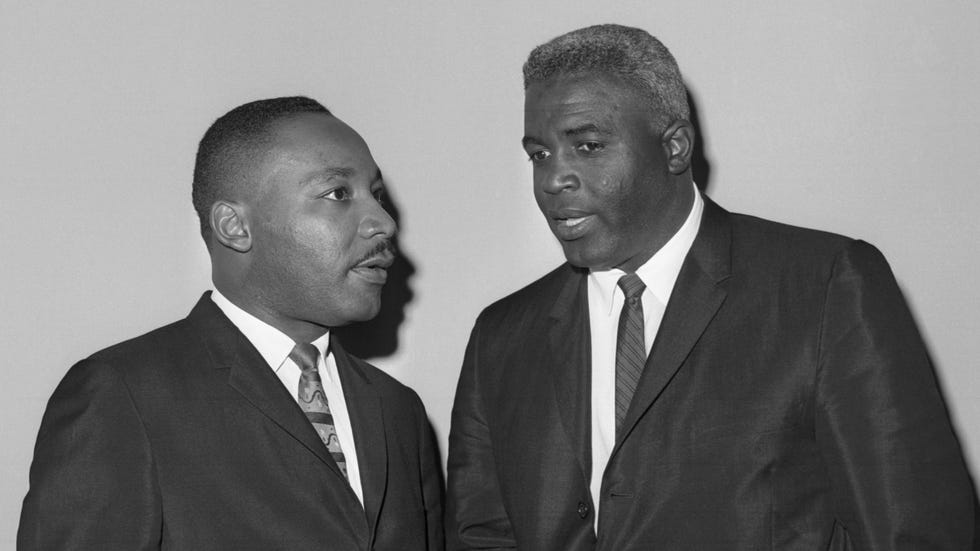
Robinson took to advocating advancement through "the ballot and the buck." He became a prominent political supporter, throwing his weight behind Richard Nixon during the 1960 presidential election, and eventually emerging as a strong ally of moderate New York Republican Nelson Rockefeller . He also backed his talk for economic independence by helping to found the Black-owned Freedom National Bank, which provided loans and services for the minority community.
However, by the mid-1960s Robinson was becoming an outdated figure in the Civil Rights movement. An advocate of the non-violent approach of Dr. King and the NAACP, he rejected the more extreme measures proposed by charismatic young leaders like H. Rap Brown and Huey Newton , and engaged in a nasty back-and-forth with Malcolm X through his column. Even his shine as a Black sports icon was somewhat diminished, with contemporary athletes like Muhammad Ali and Jim Brown dominating their fields and speaking out in ways that had seemed unthinkable 20 years earlier.
Robinson had his own share of issues with the NAACP, and in 1967 he publicly split with the organization over its "unresponsive" leadership. Furthermore, his political views left him increasingly isolated as an activist; he clashed with Dr. King over the support of the Vietnam War, and he returned to Nixon in 1968 and 1972, even as many of his fellow African Americans were abandoning the Republican Party.
Still, Robinson continued fighting for larger causes even as his own health deteriorated. In 1970 he launched the Jackie Robinson Construction Company to build low and moderate-income housing for minorities. In October 1972, during a ceremony to throw out the first pitch before a World Series game, he made a point to remind everyone that baseball had yet to appoint its first Black manager. Nine days later, he was dead from a heart attack.
Robinson is justly remembered for breaking down racial barriers and opening the doors of opportunity for Black people across professional sports. But long after he was done with baseball, he continued to fight for equal footing as a writer, organizer, speaker, businessman and political supporter, facing a far more expansive playing field without many of the natural advantages he enjoyed as a gifted athlete. For that, he deserves just as much credit when we remember him as an American hero.
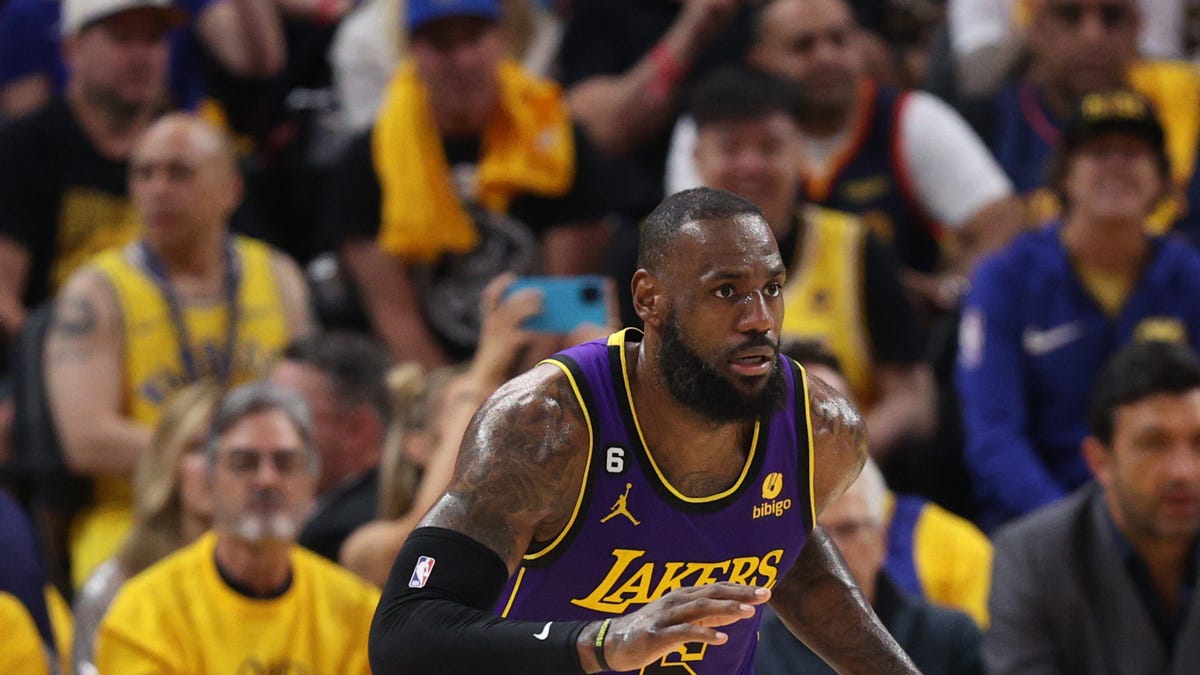

Black History
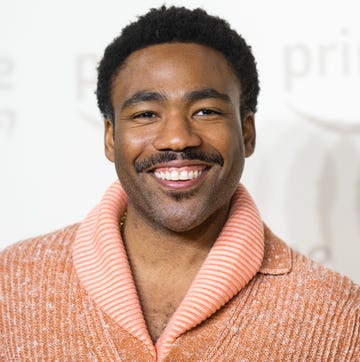
Donald Glover
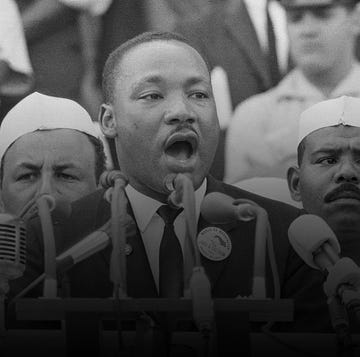
MLK Almost Didn’t Say “I Have a Dream”
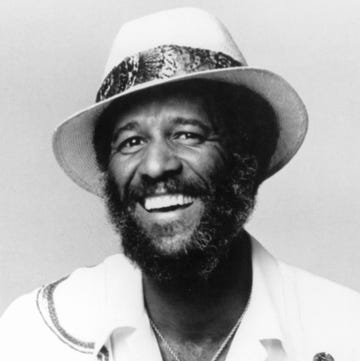
Kamala Harris

Ray Charles
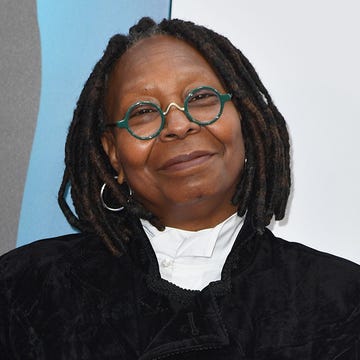
Whoopi Goldberg
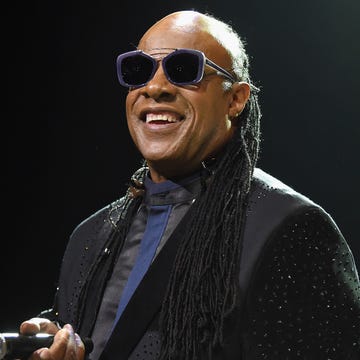
Stevie Wonder
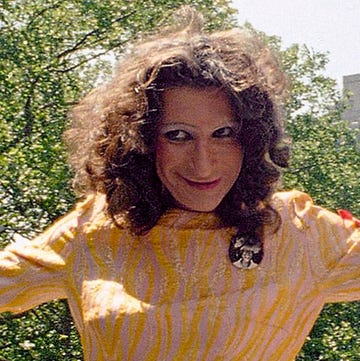
Sylvia Rivera
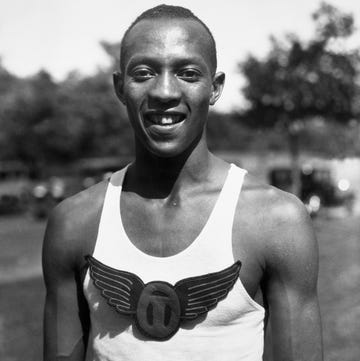
Jesse Owens
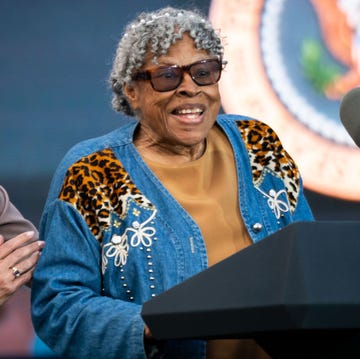
Opal Lee: The “Grandmother of Juneteenth”

13 Powerful Marsha P. Johnson Quotes

Marsha P. Johnson
- History Classics
- Your Profile
- Find History on Facebook (Opens in a new window)
- Find History on Twitter (Opens in a new window)
- Find History on YouTube (Opens in a new window)
- Find History on Instagram (Opens in a new window)
- Find History on TikTok (Opens in a new window)
- This Day In History
- History Podcasts
- History Vault
Jackie Robinson
By: History.com Editors
Updated: March 29, 2023 | Original: October 29, 2009

Jackie Robinson was an African American professional baseball player who broke Major Leagues Baseball’s infamous “ color barrier ” when he started at first base for the Brooklyn Dodgers on April 15, 1947. Until that time, professional ballplayers of color suited up for teams only in the Negro Leagues . Today, April 15th is observed as Jackie Robinson Day throughout MLB franchises, with players wearing the former Dodgers’ jersey number 42. Robinson’s dazzling athletic prowess and grace under pressure effectively led to the integration of the Major Leagues, and his 10-year career with the Dodgers — and his outspoken activism in his later years — helped set the stage for the burgeoning civil rights movement .
When Was Jackie Robinson Born?
Jackie Robinson was born on January 31, 1919, in Cairo, Georgia, to a family of sharecroppers . He was the youngest of five children.
After his father abandoned the family in 1920, they moved to Pasadena , California, where his mother, Mallie, worked a series of odd jobs to support herself and her children. Though Pasadena was a fairly affluent suburb of Los Angeles at the time, the Robinsons were poor, and Jackie and his friends in the city’s small Black community were often excluded from recreational activities.
That began to change when Jackie enrolled at John Muir High School in 1935. His older brother Mack, a silver medalist in track and field at the 1936 Olympics in Berlin , inspired him to pursue his interest in athletics, and the younger Robinson ultimately earned varsity letters in baseball, basketball, football and track while at Muir.
After graduating high school, Jackie attended Pasadena Junior College for two years, where he continued to have success in all four sports. Following the death of another older brother, Frank, in a motorcycle accident, Jackie decided to honor his memory by enrolling at UCLA in 1939.
There, he became the first Bruin to earn varsity letters in four sports — the same four in which he starred in high school — and he won the NCAA long jump championship in 1940. Jackie also met his future wife, Rachel, while at UCLA.
Did you know? In 1997, 50 years after Robinson integrated baseball, his number, 42, was permanently retired by every team in Major League Baseball.
Jackie Robinson in the U.S. Army
Jackie ultimately left college in the spring of his senior year, just a few credits short of his graduation. He accepted a job as an athletic administrator, but his dreams remained focused on the field of play.
He spent two years playing semi-professional football for integrated teams in leagues in Hawaii and California before being drafted into the U.S. Army in the spring of 1942, during World War II , although he never saw combat.
He was accepted into Officer Candidate School and was assigned to segregated Army units, first in Kansas and then in Texas. During this time, however, he remained close to Rachel, with whom he became engaged in 1943.
In 1944, Jackie was nearly court-martialed after he boarded a bus at Fort Hood in Texas and refused the driver’s order to sit in the back, as segregationist practices in the United States dictated at the time.
He was acquitted on all the charges and court-martialed, but it has been said that his experiences during the proceedings likely shaped his response to the racist taunts he received, a few years later, from fans and fellow players at the start of his professional baseball career.
Jackie was honorably discharged from the Army in November 1944, and he took a job coaching basketball at a college in Austin , Texas.
Jackie Robinson's Professional Sports Career
In early 1945, Jackie Robinson was signed by the Negro League team the Kansas City Monarchs, where he starred for one season, hitting .387.
At the time, Brooklyn Dodgers executive Branch Rickey was scouting the Negro Leagues, looking for players who not only had the talent but the demeanor to withstand the pressures associated with integrating Major League Baseball . Robinson was one of several players Rickey interviewed in August 1945 for assignment to the Dodgers’ farm team in Montreal, the Royals.
It is said that during the interview, Rickey demanded that Robinson not respond when on the receiving end of racial abuse. Robinson reportedly said, “Are you looking for a Negro who is afraid to fight back?” To which Rickey replied that he was looking for a person “with guts enough not to fight back.”
Once Robinson agreed to “turn the other cheek,” a Biblical phrase used by the religious baseball executive, he was assigned to the Royals for the 1946 season, where he was embraced by Montreal fans and batted an impressive .349. His performance both on and off the field earned him a call-up to Brooklyn the following season.
Jackie Robinson and the Dodgers
His debut with the Dodgers in 1947 was greeted with a lot of attention—not all of it positive. Although Robinson quickly proved he belonged as a player, the color of his skin was an issue for opposing teams and fans.
Hearing racist taunts from fans and players prior to a game, Dodgers teammate Pee Wee Reese is said to have put his arm around Robinson on the field to indicate that he was accepted by those wearing a Brooklyn uniform. Still, Robinson endured racist obscenities, hate mail and death threats for much of his career.
It was his play in the field that ultimately silenced his critics. In 1947, his first year with the Dodgers, he earned the inaugural “Rookie of the Year” award. Despite having been signed by the Dodgers at the relatively old age of 28, Robinson would go on to hit .311 over a 10-year career. He became the first Black player to win the National League Most Valuable Player Award in 1949, when he led the league in hitting with a .342 average, most stolen bases (37) and achieving a career-high 124 RBI. Robinson was an All-Star every year from 1949-1954. He led Brooklyn to a World Series championship over the rival New York Yankees in 1955.
Robinson retired after that season, and thus didn’t follow the Dodgers when the club moved to Los Angeles following the 1957 campaign.
Jackie Robinson Quotes
“I’m not concerned with your liking or disliking me … all I ask is that you respect me as a human being.”
“A life is not important except in the impact it has on other lives.”
"Baseball is like a poker game. Nobody wants to quit when he's losing; nobody wants you to quit when you're ahead.”
"Life is not a spectator sport. If you're going to spend your whole life in the grandstand just watching what goes on, in my opinion you're wasting your life."
"There's not an American in this country free until every one of us is free."
"As I write these words now I cannot stand and sing the National Anthem. I have learned that I remain a Black in a white world."
"Above anything else, I hate to lose."
Jackie Robinson: Legacy and Death
After retiring from the Dodgers, Robinson acted as a sportscaster, worked as a business executive at Chock full o'Nuts and was active in the NAACP and other civil rights groups.
Weakened by heart disease and diabetes, Robinson died in 1972 at the age of 53 from a heart attack suffered at his home in Stamford , Connecticut.
Thousands attended his funeral service, including former teammates and other professional athletes. His eulogy was delivered by the Reverend Jesse Jackson , who declared, “When Jackie took the field, something reminded us of our birthright to be free.”
Jackie Robinson Foundation Scholarship
Following his death, his wife Rachel, by then an assistant professor in the Yale School of Nursing , established the Jackie Robinson Foundation . In addition to recognizing other trailblazers in sports, the foundation awards the Jackie Robinson Foundation Scholarship to minority students.
Robinson’s jersey number 42 was retired by all big-league teams in 1997, meaning it could no longer be worn by any player. Those players already wearing the number were allowed to keep it.
The gesture was meant to honor Robinson’s legacy and the historic impact he had on professional baseball, sports in general and, by extension, American society, and in recognition of the difficulties the athlete faced in breaking Major League Baseball’s color barrier.
Jackie Robinson Movies: ‘The Jackie Robinson Story’ and ‘42’
In 1950, Robinson played himself in a movie on his life called “ The Jackie Robinson Story .” And in 2013, a movie about Robinson’s life called “ 42 ” was released to critical acclaim, with his widow involved in the production.
Baseball Hall of Fame. “Jackie Robinson.” BaseballHall.org . Lamb, C. (2019). “How Jackie Robinson’s wife, Rachel, helped him break baseball’s color line.” TheConversation.com . Breslin, Jimmy. (2011). Branch Rickey: A Life . Penguin Random House . Jackie Robinson: 7 memorable quotes. ABC7NY.com . Jackie Robinson. Baseball Reference .
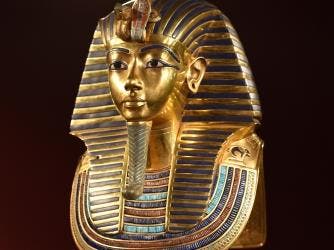
Sign up for Inside History
Get HISTORY’s most fascinating stories delivered to your inbox three times a week.
By submitting your information, you agree to receive emails from HISTORY and A+E Networks. You can opt out at any time. You must be 16 years or older and a resident of the United States.
More details : Privacy Notice | Terms of Use | Contact Us
We are open on Tuesday, October 29 and Wednesday, October 30 from 11am to 6pm. Plan your visit or become a member today! Now booking school field trips for Fall 2024 and Spring 2025!
About Jackie Robinson
On April 15, 1947, Jackie Robinson became the first African American to play Major League Baseball in the modern era. He would later become the first African American named a vice president at a fortune 500 company; serve as an advisor to politicians; start a bank and a housing development company; and, was a key figure in advancing equal opportunity and first-class citizenship for all Americans during the Civil Rights Movement of the 1950s and 60s. Hailed a “..freedom rider before freedom rides,” Robinson’s name has become synonymous with breaking barriers.
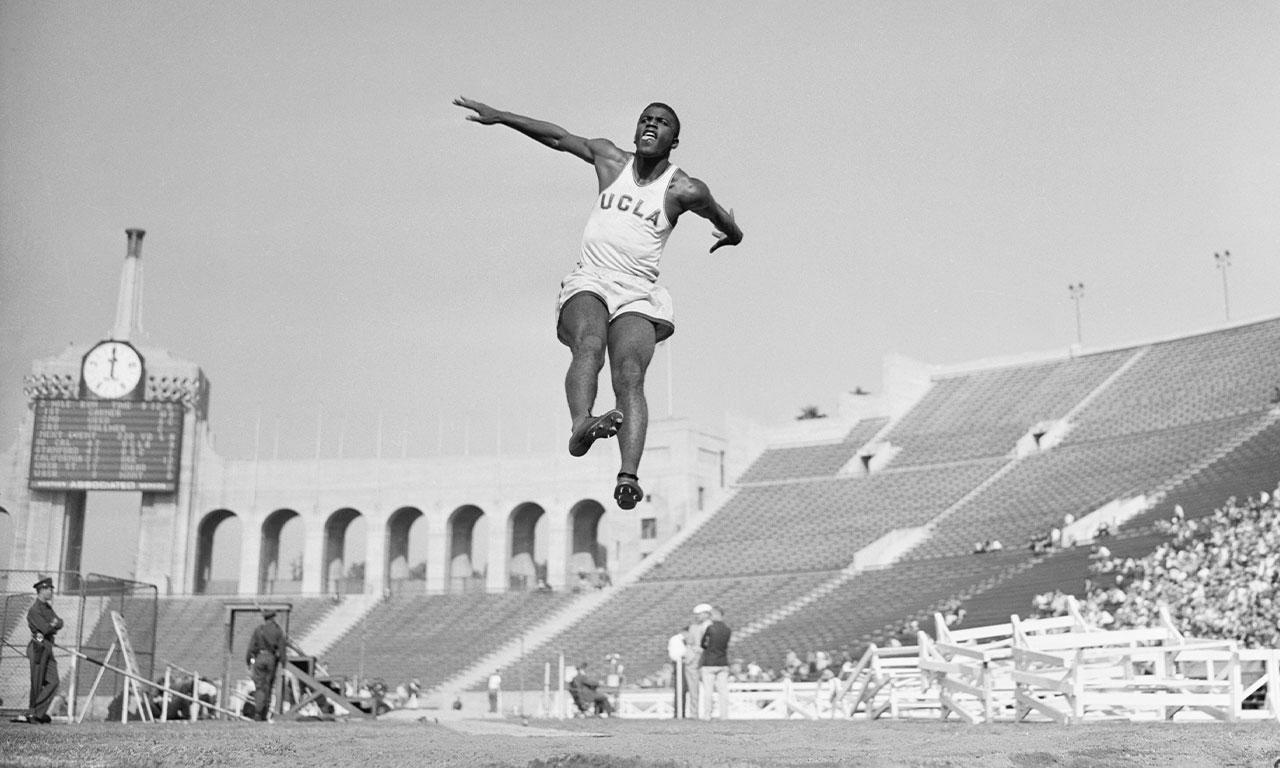
EARLY LIFE AND GATEWAY INTO SPORTS
Jackie Robinson was born on January 31, 1919, in Cairo, Georgia, the son of a sharecropper and the grandson of former slaves. Young Jackie grew up in Pasadena, California, raised by a single working mother of five. After graduating from Pasadena Junior College, Jackie attended the University of California Los Angeles. A star athlete, Jackie became the university’s first four-sport letter winner, excelling in football, basketball, track and field, and baseball. After leaving UCLA, he served in the U.S. Army during World War II, but was court marshalled and honorably discharged for standing up for his rights and refusing to move to the back of a segregated military bus.
Upon returning home from the military, Jackie Robinson set his sights on joining baseball’s Negro Leagues and began playing shortstop for the Kansas City Monarchs in 1945. Later that year, opportunity beckoned when Branch Rickey, the general manager of the Brooklyn Dodgers, invited Robinson to become the first African American to play with the all-white Dodgers’ farm team, the Montreal Royals. Anticipating the great adversity that Robinson would face as he integrated modern baseball, Rickey professed he needed a player who could bear the torment, famously telling Robinson he was “looking for a ballplayer with guts enough not to fight back.”

AN UNPRECEDENTED CAREER IN THE MAJOR LEAGUES
On April 15, 1947, Jackie Robinson stepped onto Ebbets Field for his first game with the Brooklyn Dodgers. It was the beginning of an unparalleled career in baseball. At the end of his explosive ten years as a Dodger, his record included a .311 batting average, 137 home runs, 734 runs batted in, and 197 stolen bases. In 1955, he helped the Dodgers beat the New York Yankees to win their first World Series Championship. Robinson took home the Rookie of the Year Award in 1947, the Most Valuable Player Award in 1949, and in 1962 became the first African American inducted into the Baseball Hall of Fame.
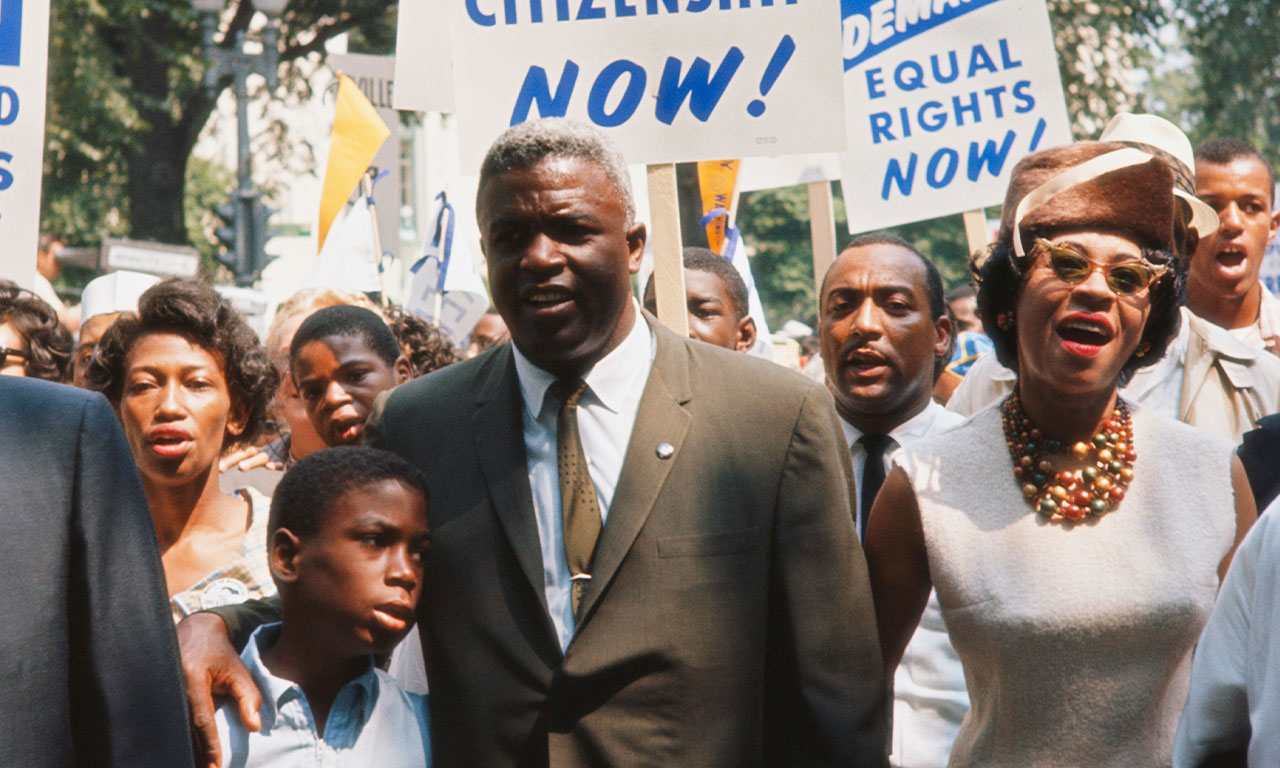
THE FIGHT FOR FIRST CLASS CITIZENSHIP FOR ALL
After integrating baseball, Robinson became a full-fledged leader in the Civil Rights Movement. He used his celebrity status to further human rights and endeavored to change the landscape of race relations in the United States. Upon retiring from the game in 1957, Robinson was hired to serve as the Vice President for Personnel at Chock full o’ Nuts, the first African American to be named a Vice President of a major American company. He used his position at Chock full o’ Nuts to improve working conditions for employees.
An active member of the NAACP, Robinson was often a featured speaker at civil rights rallies including the famed March on Washington in 1963, and frequently participated in picket lines. As a nationally syndicated columnist for the New York Post and New York Amsterdam News, Robinson wrote passionately on social issues, sports, and family life, always encouraging people in his community to become active in politics and business.
In 1964, Robinson co-founded Freedom National Bank of Harlem, a Black owned and operated bank created for the express purpose of financially aiding African American communities. In 1970, he founded the Jackie Robinson Construction Company, which sought to provide housing for low-income people.
In 1972, just twenty-five years after the start of the “Great Experiment,” Jackie Robinson died following his decade long battle with diabetes.
An Enduring Legacy

1947 – Rookie of the Year Award
Honored by the Baseball Writers Association and the Sporting News, Jackie Robinson won the inaugural Rookie of the Year award for his trailblazing 1947 season. Robinson batted .297, scored 125 runs, hit 12 home runs, 31 doubles and led the National League with 29 stolen bases, taking the Brooklyn Dodgers to a World Series against the New York Yankees. Originally named the J. Louis Comiskey Memorial Rookie of the Year Award, it was renamed the Jackie Robinson Rookie of the Year Award in 1987 to commemorate the 40 th anniversary of Robinson breaking the color barrier.
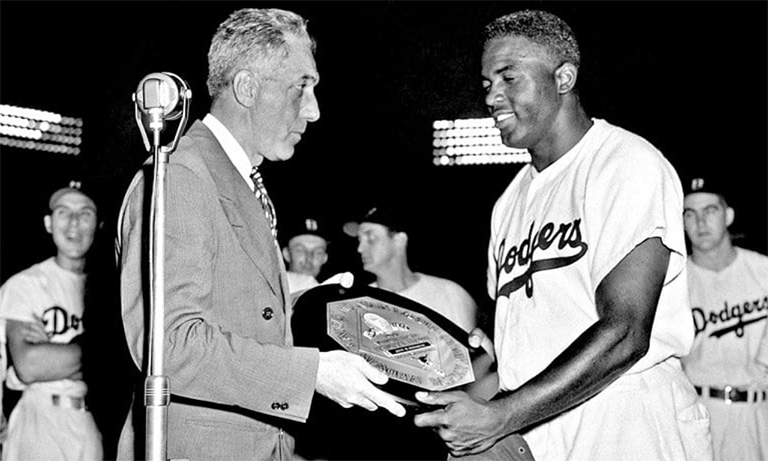
1949 – Most Valuable Player Award
Robinson garnered 264 of 336 points from the Baseball Writer’s Association and was named the 1949 National League’s Most Valuable Player. A dominant figure on the field that year, he played all 156 games, and was the National League’s batting and base stealing champion; was second in hits (203) runs batted in (124), doubles (38), triples (12); and third in runs scored (122). He would lead the Dodgers to the World Series where they lost to the Yankees in five games.
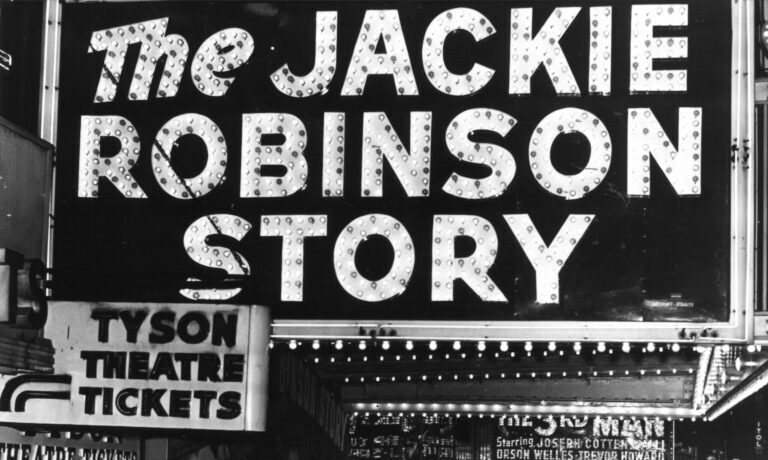
1950 – The Jackie Robinson Story
“The Jackie Robinson Story” starring Jackie as himself and Ruby Dee as Rachel Robinson premiered May 16, 1950, beginning decades of depictions of Robinson on screen, on the stage, and in the popular culture. With Robinson starring as himself, the film attempted to capture a transformative moment, not only in baseball but in American history as it was happening. Robinson himself uses the film to open doors for African American actors, demanding that performers such as Bernie Hamilton, George Dockstader and Roy Glenn be written into the script.
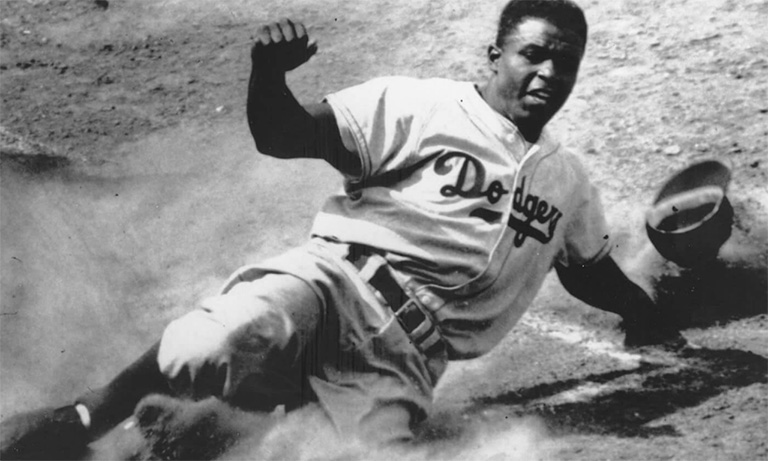
1955 – World Series Champion
Jackie Robinson led the Brooklyn Dodgers to six World Series, with the team eventually winning the championship in 1955 against their cross-town rivals, the New York Yankees. Appearing in six games, Robinson went 4-for-22 with one double, one triple, one RBI, two walks and famously stole home base during game one of the series.
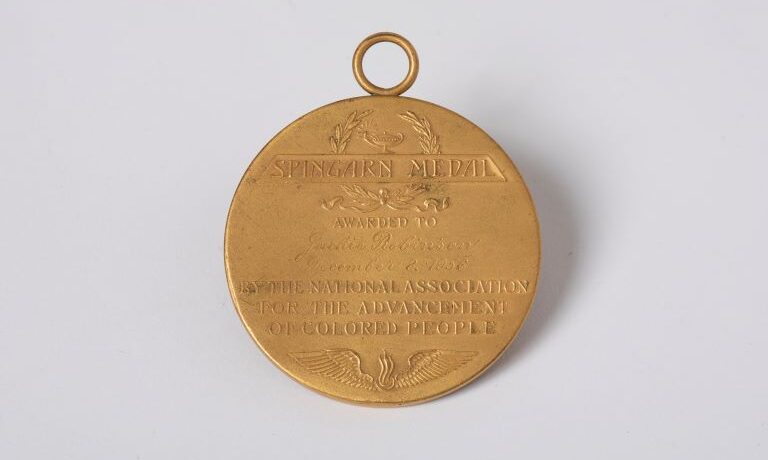
1956 – NAACP Spingarn Medal
The Spingarn Medal awarded annually by the National Association for the Advancement of Colored People (NAACP) since 1915 for outstanding achievement by an African American. Established June 29, 1914, it is named for Joel Elias Spingarn, a white writer, educator, and civil rights activist who served as the NAACP Chairman of the Board of Directors from 1913-1919 and as president from 1930-1939. Jackie was awarded the Spingarn Medal for “superb sportsmanship and for his singular role in athletics on December 8, 1956.
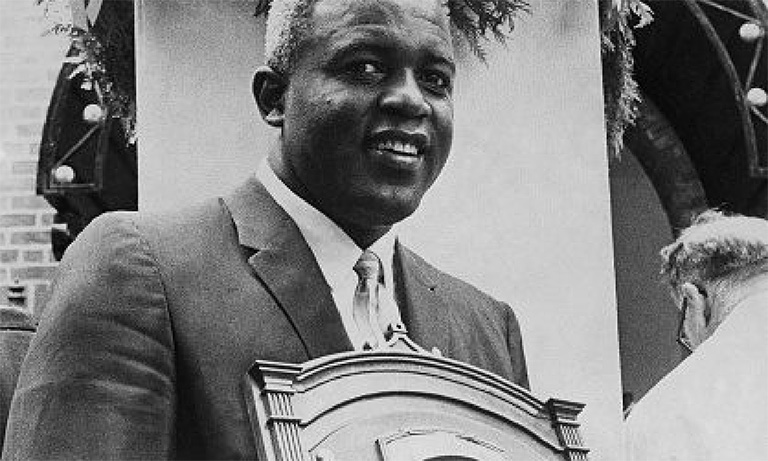
1962 – Hall of Fame Induction
Five years after retiring from baseball Robinson was elected to Baseball’s Hall of Fame. He and his co-inductee Bob Feller were the first, first-ballot electees by the Baseball Writer’s Association since the inaugural class in 1936. Among his many accomplishments were his .311 batting average, 197 stolen bases, scoring more than 100 runs a year, six times and his six All Star game appearances.
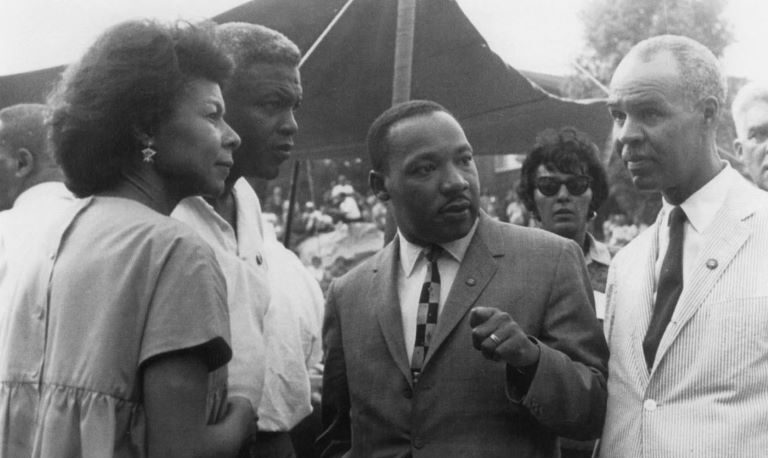
1963 – Afternoon of Jazz
In response to rising racial violence and the assassination of Medgar Evers, Rachel and Jackie begin strategizing their deepening involvement in the Civil Rights Movement, culminating in a fundraising concert, An Afternoon of Jazz, on their property in Stamford, Connecticut. The concert, the first in what would become an annual event, supports Martin Luther King Jr.’s Southern Christian Leadership Conference and features Dizzy Gillespie and Dave Brubeck. A second concert was held the first year to raise bail money for students participating in lunch counter sit-ins.
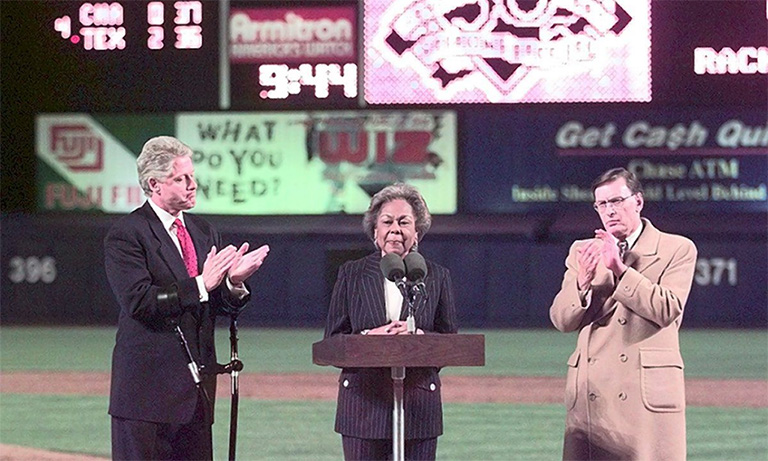
1997 – Number “42” Retired
A year-long celebration marks the 50 th anniversary of Robinson’s April 1947 debut with the Brooklyn Dodgers. In the same year, the U.S. Postal Service releases a Jackie Robinson stamp, the U.S. Mint produces gold and silver Robinson coins, and Sharon and Rachel Robinson publish books in commemoration of Robinson’s legacy. Upon the initiative of Leonard S. Coleman Jr., former president of the National League and chairman of the Jackie Robinson Foundation, Major League Baseball retires the number 42 from baseball, the only number retired throughout the leagues.
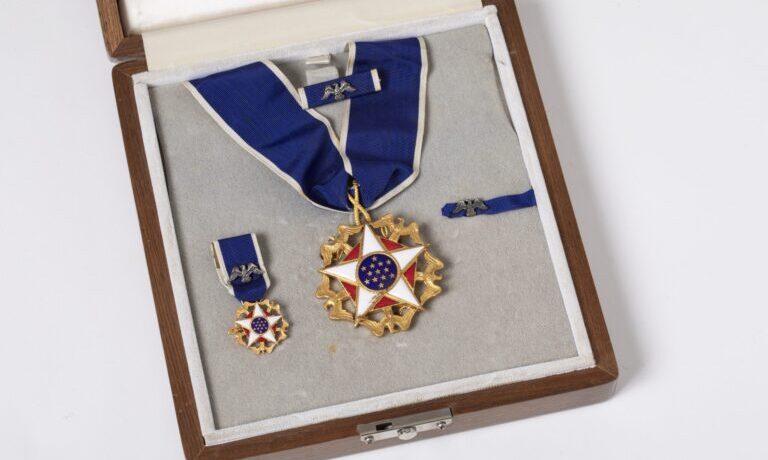
1984 – Presidential Medal of Freedom
The Presidential Medal of Freedom is the highest civilian decoration awarded in the U.S. by a sitting president. Jackie Robinson was posthumously awarded the medal by President Ronald Reagan in 1984, who stated, “He bravely demonstrated to all that skill and sportsmanship, not race or ethnic background, are the qualities by which athletes should be judged. In doing so, he struck a mighty blow for equality, freedom, and the American way of life.”
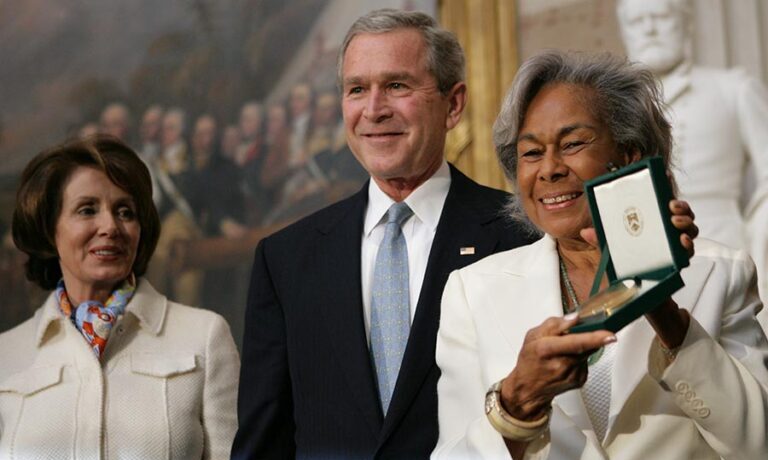
2005 – Congressional Gold Medal
Jackie Robinson is posthumously awarded the Congressional Gold Medal of Honor by President George W. Bush, the legislative branch’s highest honor. The medal was presented to Rachel Robinson on March 2, 2005, in a ceremony in the Capitol Rotunda before congressional leaders and the commissioner of Major League Baseball. The award honors Robinson’s contributions on the field as a talented baseball player who faced unprecedented challenges in integrating Major League Baseball. Rachel recognized the award as a tribute to her husband’s unwavering courage and conviction as a “heroic role model for Americans who believe in justice and equality.”
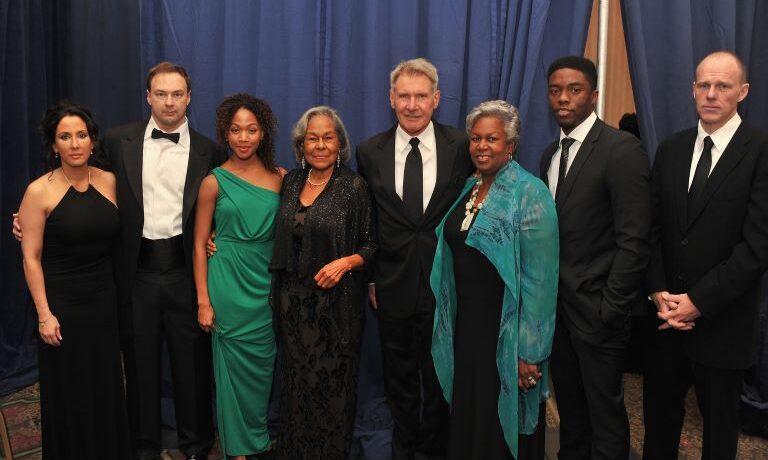
2013 – “42” Film Premiere
The biographical film 42 by director Brian Helgeland is released in American movie theaters starring Chadwick Boseman as Jackie Robinson and Harrison Ford as Branch Rickey on April 12, 2013. The movie tells the story Jackie Robinson’s racial integration of professional baseball and gives audiences a sense of how the legacy of Jackie Robinson has been remembered decades later.
HOURS: 11 AM - 6 PM, Thu - Sun

COMMENTS
Who Was Jackie Robinson? Baseball player Jackie Robinson broke Major League Baseball’s color barrier as its first Black athlete. The infielder made his debut with the Brooklyn Dodgers on April...
Jackie Robinson was the first African American to play in the United States during the 20th century. On April 15, 1947, he broke the decades-old “colour line” of Major League Baseball when he appeared on the field for the National League in a game against the Boston Braves.
Jack Roosevelt Robinson (January 31, 1919 – October 24, 1972) was an American professional baseball player who became the first African-American to play in Major League Baseball (MLB) in the modern era. Robinson broke the color line when he started at first base for the Brooklyn Dodgers on April 15, 1947.
The Activism of Jackie Robinson Robinson, best remembered for integrating major league baseball, also left behind an impressive record as a crusader for African American rights after he hung...
Jackie Robinson, the first Black athlete to play Major League Baseball, joined the Brooklyn Dodgers on April 15, 1947, a date now famous as Jackie Robinson Day.
THE FIGHT FOR FIRST CLASS CITIZENSHIP FOR ALL. After integrating baseball, Robinson became a full-fledged leader in the Civil Rights Movement. He used his celebrity status to further human rights and endeavored to change the landscape of race relations in the United States.